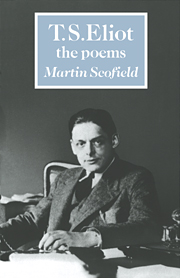Book contents
- Frontmatter
- Contents
- Acknowlegements
- Chronology
- Introduction
- 1 Aspects of the life of the poet
- 2 Early poetic influences and criticism, and Poems Written in Early Youth
- 3 Prufrock and Other Observations (1917)
- 4 Poetic theory and poetic practice
- 5 Poems (1920)
- 6 The Waste Land (1922)
- 7 From The Hollow Men (1925) to ‘Marina’ (1930)
- 8 Poetry, pattern and belief
- 9 From Coriolan (1931) to ‘Burnt Norton’ (1936)
- 10 ‘Burnt Norton’ (1936) and the pattern for Four Quartets
- 11 The wartime Quartets (1940–2)
- Notes
- Select bibliography
- Index
6 - The Waste Land (1922)
Published online by Cambridge University Press: 18 January 2010
- Frontmatter
- Contents
- Acknowlegements
- Chronology
- Introduction
- 1 Aspects of the life of the poet
- 2 Early poetic influences and criticism, and Poems Written in Early Youth
- 3 Prufrock and Other Observations (1917)
- 4 Poetic theory and poetic practice
- 5 Poems (1920)
- 6 The Waste Land (1922)
- 7 From The Hollow Men (1925) to ‘Marina’ (1930)
- 8 Poetry, pattern and belief
- 9 From Coriolan (1931) to ‘Burnt Norton’ (1936)
- 10 ‘Burnt Norton’ (1936) and the pattern for Four Quartets
- 11 The wartime Quartets (1940–2)
- Notes
- Select bibliography
- Index
Summary
Like other of Eliot's longer works, The Waste Land was composed in fragments over a period of time, the earliest (which appeared in ‘The Death of Saint Narcissus’) dating from 1914–15. These were afterwards put together and ‘edited’, with the decisive help of Ezra Pound, into the final version that we know today. The process of the poem's composition can be followed in The Waste Land: A Facsimile and Transcript, edited by Valerie Eliot in 1971, which includes all the original drafts and Pound's annotations. The book is an invaluable insight into the way the final poem came about, and offers some interesting examples of verse which Eliot finally discarded from the poem and from his Collected Poems: we can see the poet's mind at work and assess his critical decisions (and Pound's critical advice) about the selection of passages, and the alteration of lines. But the final poem is what matters most in the end, and I shall not in this chapter attempt to give an account of the ur-version. As most critics agree, the poem is immeasurably improved in its final form, and in almost every case the material finally omitted is manifestly inferior. With Pound's help (‘il miglior fabbro’ – ‘the better craftsman’ – is Eliot's fitting tribute to him in the dedication of the poem) the poem finally ‘came together’.
- Type
- Chapter
- Information
- T. S. Eliot: The Poems , pp. 108 - 136Publisher: Cambridge University PressPrint publication year: 1988

